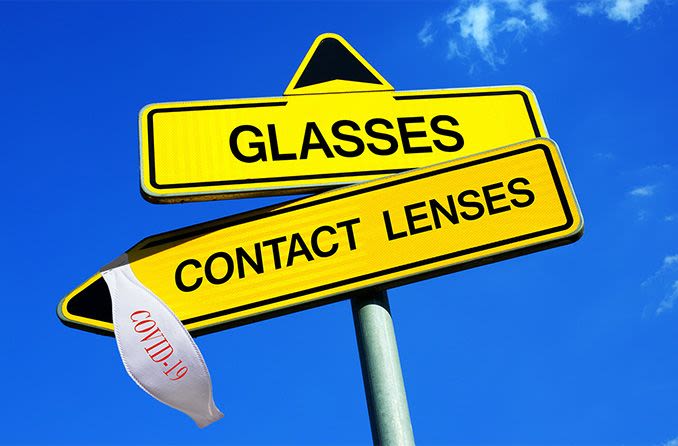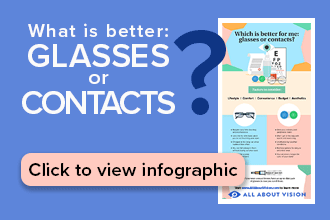Coronavirus and your eyes: Should you switch from contacts to glasses?

Switch from contacts to glasses to reduce coronavirus?
You may have heard that you should switch from your contact lenses and wear your eyeglasses during the COVID-19 pandemic.
Why switch? One group of eye doctors, the American Academy of Ophthalmology (AAO), states that contact lenses may contribute to the spread of the new coronavirus, and wearing glasses may add a layer of protection against transmission of the COVID-19 disease.
Why you might not need to switch? Another group of eye doctors, the American Optometric Association (AOA), states that wearing contact lenses is safe and that “there is no scientific evidence that wearing spectacles or glasses provides protection against COVID-19 or other viral transmissions.”
Are contact lens wearers more risk for COVID-19 transmission?
Some fear that contact lens wearers touch their eyes more than the typical person, and touching your eyes, nose or face (or any mucous membrane) increases your risk of contracting coronavirus.
“Consider wearing glasses more often, especially if you tend to touch your eyes a lot when your contacts are in,” says Dr. Sonal Tuli, an ophthalmologist in Gainesville, Florida, in a post on the AAO website.
“Substituting glasses for lenses can decrease irritation and force you to pause before touching your eye,” says Tuli, a spokesperson for the American Academy of Ophthalmology.
Wearing glasses instead of contacts also might shield your eyes to some degree from respiratory droplets — produced by coughing or sneezing — that might contain the virus, the AAO says.
SEE RELATED: Coronavirus: How eyes may play a role in its spread
Some eye doctors say wearing contacts is safe
Dr. Susan Resnick, an optometrist in the New York City area, says it’s OK to wear contact lenses unless you’re sick. That advice applies even if you’re fighting a common cold.
The safest option to decrease the risk of any contact lens-related infection is daily disposable lenses that you throw away after the one-day wearing period, Resnick adds.
“Healthy individuals can continue to wear and care for their contact lenses as prescribed by their doctor,” the American Optometric Association says.
Three prominent eye care researchers recently stated that “Contact lens wear remains a safe and highly effective form of vision correction for millions of people worldwide.”
For many, a contact lens is a necessary tool for vision correction. A contact lens is a medical device and provides great visual benefits.
The three eye care researchers and the AOA also dispute the benefit of wearing glasses to thwart COVID-19.
No scientific evidence supports that wearing glasses protects someone from being infected with the new coronavirus or any other virus.
Eye doctors agree: Be vigilant in the care of contacts & glasses
Proper care of your contact lenses — and glasses — is especially important during this virus pandemic, as it should be to maintain optimal health at all times.
“It’s important to remember that although there is a lot of concern about COVID-19, common-sense precautions can significantly reduce your risk of getting infected,” Tuli says.
“So, wash your hands a lot, follow good contact lens hygiene, and avoid touching or rubbing your nose, mouth and especially your eyes,” she adds.
For contact lens wearers, the AAO and AOA offer these tips to reduce your risk of coronavirus infection:
Thoroughly wash your hands with soap and water for at least 20 seconds, and then dry them with a lint-free towel before handling your contacts. This should occur before every contact lens insertion and removal. If soap and water are not readily available, use a hand sanitizer that contains at least 60% alcohol.
Disinfect your contact lenses properly. You should either dispose of your daily disposable lenses each evening, or regularly disinfect your monthly and two-week lenses according to instructions from the manufacturer and your eye doctor. Don’t use saline solution and rewetting drops to disinfect your contacts. Neither one is an effective or approved disinfectant.
Discontinue lens wear if you are sick. Consistent with recommendations for other types of illness, those who feel ill with cold or flu-like symptoms should cease contact lens wear.
The American Academy of Optometry statement on COVID-19 and contact lens wear states that “contact lenses are medical devices and should always be used with proper handling and hygiene as prescribed by your eye care professional”.
You should also take extra precautions if you wear glasses.
Resnick notes that the new coronavirus can remain on hard surfaces for hours to days, and then can transfer from your hands to your face and glasses. Therefore, glasses should be cleaned regularly.
People “who remove their glasses frequently are more prone to contamination and transfer,” she says.
Safety goggles offer better COVID-19 protection
The American Academy of Ophthalmology notes that glasses don’t offer complete protection from respiratory droplets. The virus still can reach your eyes from the exposed sides, tops and bottoms of your glasses.
If you’re caring for someone who has developed COVID-19, the disease caused by this new virus, or who potentially has been exposed to the virus, a face shield or COVID safety goggles are a safer option than regular eyeglasses to protect your eyes from the virus.
LEARN MORE about COVID and your eyes
Page published on Monday, March 30, 2020





